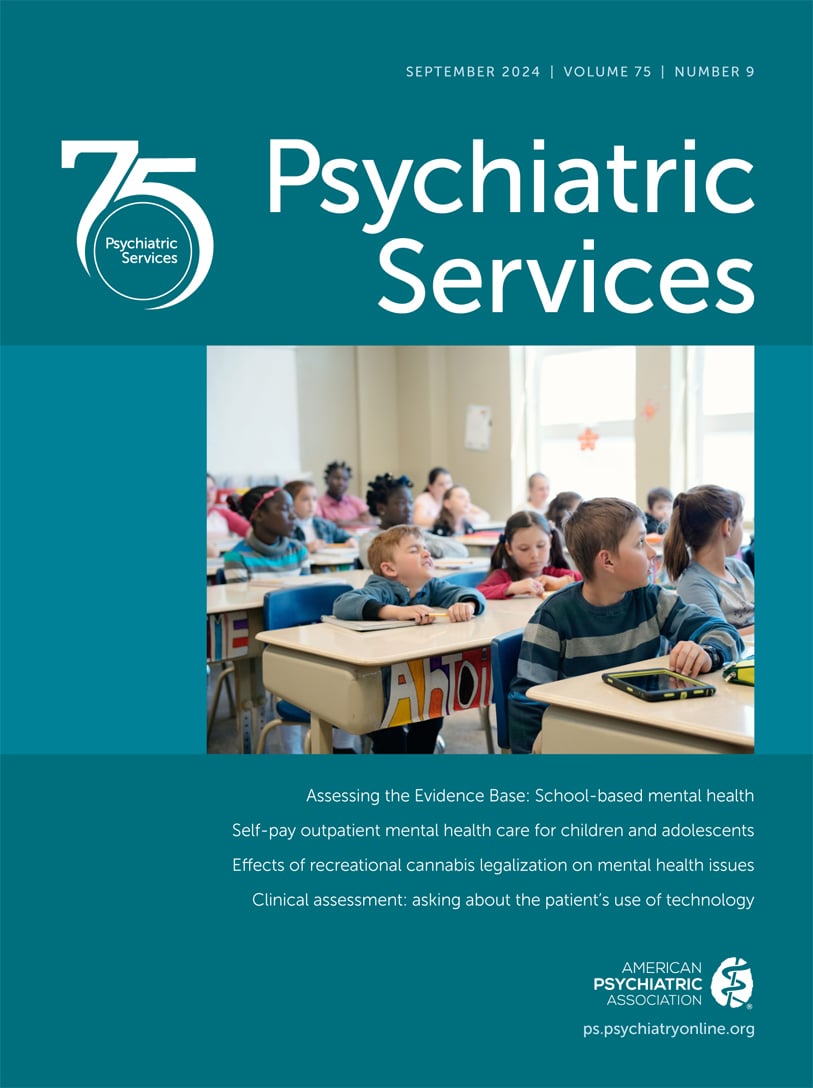Psychiatric Services
- Volume 73
- Number 11
- November 2022
Taking Issue
Articles
Publication date: 25 May 2022
Pages1202–1209After statewide COVID-19–related school closures in 2020, suicide or self-injury and depressive disorders were the primary drivers of acute mental health encounters in a sample of 44 U.S. children’s hospitals. In fall 2020, mental health hospitalizations ...
https://doi.org/10.1176/appi.ps.202100582Publication date: 20 April 2022
Pages1210–1216Reviewing 48 instead of 12 months of patients’ care history reduced estimated rates of new schizophrenia spectrum disorder diagnoses, because historical diagnoses were detected for >40% of patients. Among participants with 48 months of historical data, 63%...
https://doi.org/10.1176/appi.ps.202100696Publication date: 03 May 2022
Pages1217–1224In 2019, nearly three-quarters of Veterans Health Administration patients who were prescribed benzodiazepines had been taking these medications long term (>30 days), and half of the long-term users were over age 65, raising concerns about such risks as ...
https://doi.org/10.1176/appi.ps.202100617Publication date: 09 June 2022
Pages1225–1231Objective: This pilot randomized controlled trial evaluated the effectiveness of critical time intervention–task shifting (CTI-TS) for people with psychosis in Santiago, Chile, and Rio de Janeiro. CTI-TS is a 9-month intervention involving peer support ...
https://doi.org/10.1176/appi.ps.202000843Publication date: 03 May 2022
Pages1232–1238Between 2014 and 2019, the U.S. Hispanic population increased by 4.5%, while facilities that offered mental health treatment in Spanish declined by 17.8%. Forty-four states had a decrease in facilities offering services in Spanish, with the starkest ...
https://doi.org/10.1176/appi.ps.202100614Publication date: 23 June 2022
Pages1239–1247Objective: A 3-year study explores employment outcomes of certified peer specialists (CPSs). Analyses reported here identified relationships between demographic, clinical, work history, and geographic characteristics and employment status and current ...
https://doi.org/10.1176/appi.ps.202100651Publication date: 03 May 2022
Pages1248–1254The effect of the working alliance between clients and case managers on outcomes of mental health care is unclear. The authors report that strengths model case management fostered stronger working alliances, an effect that indirectly improved the quality ...
https://doi.org/10.1176/appi.ps.202100387Reviews & Overviews
Publication date: 27 July 2022
Pages1255–1262Objective: The term “serious mental illness” (SMI) is widely used across research, practice, and policy settings. However, there is no consistent operational definition, and its reliability has not been ...
https://doi.org/10.1176/appi.ps.202100661Special Articles
Publication date: 25 May 2022
Pages1263–1269Objective: Extreme risk protection orders (ERPOs) are civil orders designed to temporarily restrict access to firearms when people are at substantial risk of harm to themselves or others. A minority of ERPOs in the United States have been filed by ...
https://doi.org/10.1176/appi.ps.202100636Brief Reports
Publication date: 23 March 2022
Pages1270–1273Implementation of evidence-based practices (EBPs) is a key component in improving care quality. Stakeholders in behavioral health care surveyed in this study consistently ranked financial incentives as most useful and performance feedback as the least ...
https://doi.org/10.1176/appi.ps.202100453Publication date: 13 April 2022
Pages1274–1277Objective: This pilot project aimed to maximize COVID-19 vaccine uptake among patients with serious mental illness. Psychiatric providers were engaged to directly address COVID-19 vaccine–related concerns with patients during outpatient visits. Methods: A ...
https://doi.org/10.1176/appi.ps.202100702Publication date: 27 April 2022
Pages1278–1281Objective: This study aimed to update findings on the continuum of care for hepatitis C virus (HCV) infection with follow-up data for individuals with serious mental illness and to identify predictors of decisions to decline vaccination. Methods: The ...
https://doi.org/10.1176/appi.ps.202100410Publication date: 11 May 2022
Pages1282–1285Objective: This analysis examined the distribution of four social determinants of health among recipients of state-licensed mental health services and analyzed relationships between determinants and individuals’ clinical and demographic characteristics. ...
https://doi.org/10.1176/appi.ps.202100380Promoting High-Value Mental Health Care
Publication date: 11 May 2022
Pages1286–1289This clinical practice improvement project (CPIP) sought to increase the rate of referrals to psychiatric rehabilitation units among inpatients on a 44-bed men’s ward at the Institute of Mental Health, Singapore. Three root causes of low referral rates ...
https://doi.org/10.1176/appi.ps.202100475Publication date: 27 April 2022
Pages1290–1293This column describes the implementation of a multidisciplinary, team-based model of care within an outpatient psychiatry practice at a large urban academic medical center. The authors outline the process by which the innovative team-based care model was ...
https://doi.org/10.1176/appi.ps.202200030Publication date: 03 May 2022
Pages1294–1297Pharmacists tend to provide care to patients with psychiatric disorders less frequently than to other types of patients, yet patients with psychiatric disorders experience more drug-related problems and use more opioids than those without psychiatric ...
https://doi.org/10.1176/appi.ps.202100592Integrated Care
Publication date: 17 May 2022
Pages1298–1301Medicaid enrollees with behavioral health disorders often experience fragmented care, leading to high rates of preventable use of emergency departments (EDs). As part of its Medicaid Transformation Program, the Washington Health Care Authority partnered ...
https://doi.org/10.1176/appi.ps.202100626Personal Accounts
Racism & Mental Health Equity
Publication date: 20 April 2022
Pages1304–1307Inpatient psychiatric treatment and violence assessment are strongly influenced by a patient’s race and class identity. The authors argue that psychiatrists enact a crypto-apartheid wherein they recognize and condemn the structural racism and classism ...
https://doi.org/10.1176/appi.ps.202100286Publication date: 20 July 2022
Pages1308–1311Clinician bias is a contributor to health care inequities, but research on racial-ethnic bias among mental health professionals, especially toward minoritized youths, is limited. This column describes two studies involving mental health clinicians in ...
https://doi.org/10.1176/appi.ps.202100253Editor’s Choice
Letters
Other Items of Interest
Past Issues
View Issues Archive
Vol. 75 | No. 12

Vol. 75 | No. 11

Vol. 75 | No. 10
